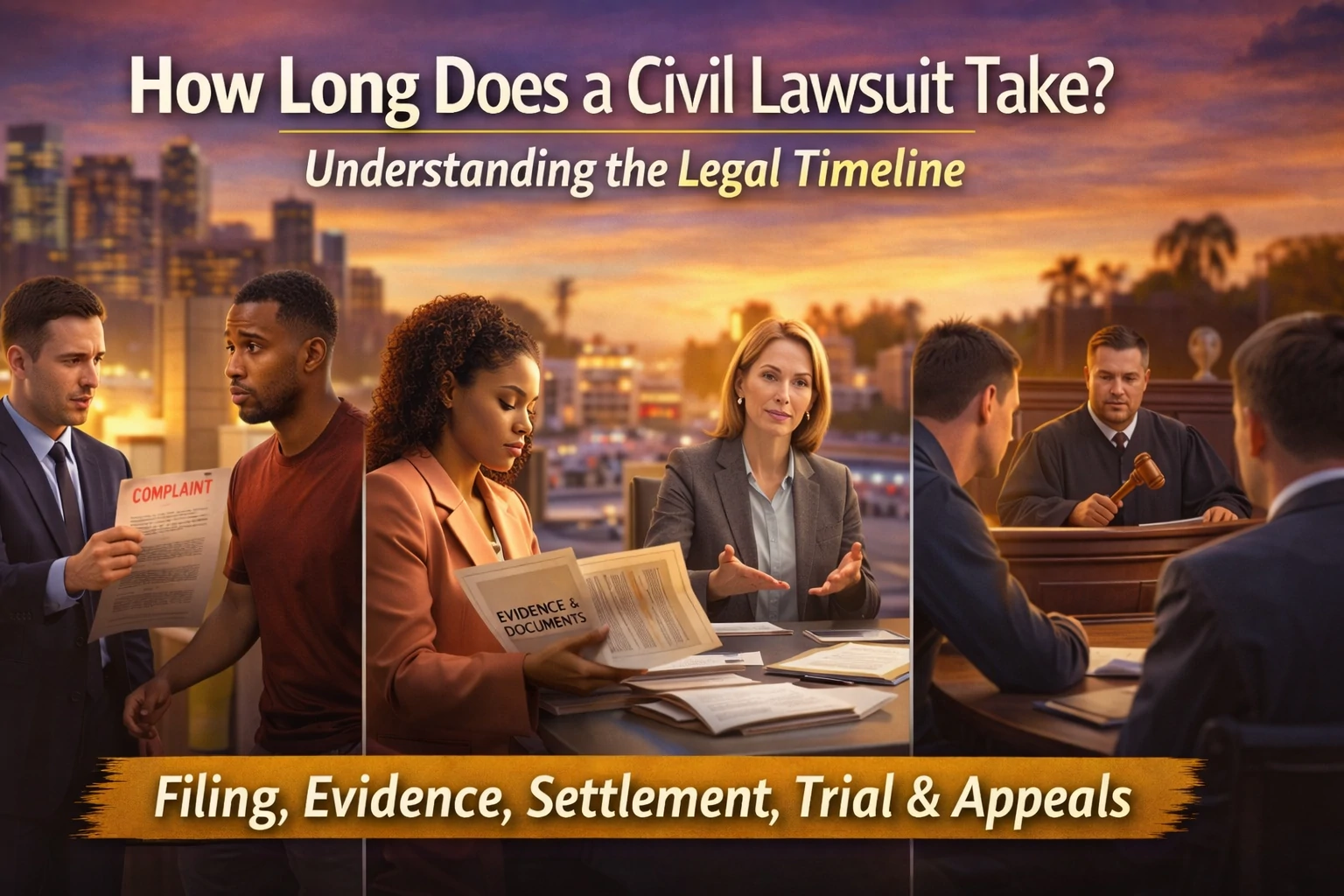A civil lawsuit takes time. People want fast results, but the court process moves slow. Even simple cases do not end overnight. Many stretch out for months. Some last years. Courts follow set steps. Each side must follow the rules. That adds delays along the way.
Most people ask one big question. How long will my case take? The answer depends on many things. It depends on the court’s schedule. It depends on how each side responds. If both parties agree early, the case may end fast. If they argue over every point, the case will take longer. Some courts also face backlogs. Judges handle many cases at once. That adds more time.
This guide breaks down the timeline in easy steps. It shows how civil lawsuits move forward. It explains where delays happen. It helps you know what to expect. If you are thinking about filing a case or already started one, this article will give you a clear path. You will see the truth in simple words. No legal jargon. Just the facts, plain and direct.
What Is a Civil Lawsuit?
A civil lawsuit is a legal fight between people or businesses. One side says the other caused harm. That harm may involve money, property, or a personal issue. The person who files the case is the plaintiff. The other side is the defendant. The court steps in to solve the problem. It decides if the defendant must pay or take some action.
Civil law does not send people to jail. It is not the same as criminal law. Civil cases do not involve crimes like assault or theft. These cases focus on money loss, broken deals, injuries, or damage. Some also cover family matters like divorce or child custody.
When you file a civil case, you ask the court to fix something. You may want payment, a repair, or a clear order. The court listens to both sides. It looks at the facts. If the two sides cannot agree, a judge or jury will make the final call.
Starting the Case: Filing the Complaint
A civil case begins when the plaintiff files a complaint. This legal paper tells the court what happened. It names the people or businesses involved. It explains why the plaintiff believes the other side caused harm. The complaint often asks the court to order money or another type of relief.
Once the complaint is ready, it goes to the court. The clerk stamps it with a case number and keeps it on record. Then the plaintiff must “serve” the complaint to the other party. That means the defendant receives an official copy. In most cases, this process takes one to two weeks.
The law sets rules for how service must happen. A process server, sheriff, or third party can deliver the papers. The court must be sure the defendant knows about the case. If service is late or wrong, it can cause delays. That’s why this first step is so important.
Waiting for the Response
After the defendant gets the complaint, they have a limited time to respond. That time depends on the state. In most places, the deadline is about 20 to 30 days. The response is called an “answer.” It may agree or disagree with the complaint. It may also raise defenses.
Some defendants ask the court to dismiss the case. This request is called a motion to dismiss. If the court agrees, the case ends early. If not, the case moves forward. These early moves take a few weeks, sometimes longer if the court has a busy schedule.
This stage can feel slow. The plaintiff may wait without updates. But delays are common. Each side must follow strict rules and deadlines. If someone misses a date, the court may take action. Some cases move faster when both sides work together. Others take longer when lawyers fight over small issues.
Discovery Takes the Longest
Discovery is the longest part of most civil lawsuits. This is when both sides gather facts. They ask questions, request documents, and take depositions. A deposition is a formal interview. One party asks the other side’s witness questions under oath. Everything gets recorded. This helps both sides know what to expect at trial.
Discovery often lasts six months to a year. If the case is complex, it may take even longer. Some lawsuits involve many people or large amounts of evidence. Each item must be reviewed. Each fact must be clear. Both sides use discovery to build their argument. If one side refuses to share information, the other can ask the court to help.
Courts want both parties to play fair. But some lawyers use delay tactics. They may flood the other side with demands. Or they may wait until the last moment to reply. These moves stretch the timeline. Still, courts try to keep discovery within a set period. Judges may schedule hearings to check progress and solve problems. Learn how legal disputes develop in cases such as the Affordable Dentures lawsuit.
Trying to Settle Before Trial
Once discovery ends, both sides know more. They may now try to settle the case. A settlement means they agree to a result without trial. Most civil lawsuits settle before they reach a courtroom. Settlement saves time, money, and stress. It also lets both sides control the outcome.
Some courts ask both sides to try mediation. A mediator helps them talk and find common ground. The mediator stays neutral and does not pick a side. They offer ideas and guide the discussion. If both sides reach a deal, the case ends. If not, the court sets a trial date. Mediation often takes one or two meetings. It may wrap up in a few weeks or take longer if more time is needed.
A case may settle at any stage. Some end early, even before both sides exchange facts. Others settle right before trial starts. Lawyers can still reach a deal during the trial. Cases with more issues often take longer. If both sides cannot agree, the court gives the final ruling.
Getting Ready for Trial
If the case does not settle, it moves to trial. Both sides must prepare. They file motions, speak to witnesses, and build their arguments. This part of the case often takes two to four months. The court then picks a trial date. Some courts face long delays, which can add more time.
Getting ready for trial takes effort. Lawyers plan each point and gather strong proof. They pick witnesses and write clear questions. The court sets rules before trial begins. These rules say how long the trial will last and what each side can show. Each detail shapes the result.
A trial may not start on time. One side may ask for more time. Some courts do not have open slots. That causes delay. Even with setbacks, courts try to move cases forward. Judges want trials to be fair and efficient.
When examining cases against medical facilities in Florida, our detailed overview of the lawsuit against a Florida hospital offers real‑world insights into how patient harm claims proceed.
The Trial Itself
The trial is the main event. This is when each side presents their case. They call witnesses, show evidence, and make arguments. Trials may be short or long. Some take one day. Others last several weeks. Most civil trials take less than two weeks.
In some cases, a jury decides. In others, a judge rules. After both sides speak, the judge or jury gives a verdict. That ends the case unless someone appeals. A clear trial result may help close the case fast. But sometimes, more steps follow.
Post-Trial Motions and Appeals
A trial does not always end the case. One side may ask the court to change the result. They might want a new verdict or less money to pay. These steps add more time. If the court agrees, the case continues. If not, the losing side can appeal. An appeal sends the case to a higher court to review the decision.
An appeal does not start the case over. It checks the trial for legal mistakes. If the higher court finds a problem, it may change the result. Some appeals take several months. Others last more than a year. This adds more delay. Still, an appeal can fix errors that the trial court missed.
The Full Timeline in Real Life
Most civil lawsuits take at least six months. Many take one to two years. Some last much longer. A simple case with few issues may settle in a few months. A complex case with many claims may stretch for three years or more. Each step adds time. Court rules, attorney schedules, and party actions all shape the timeline.
If both sides settle early, the case ends quickly. But if they argue over every issue, the process takes longer. Some cases settle just before trial. Others reach a verdict and then go to appeal. Each case moves at its own pace. Most take at least a year to finish.
What to Expect Moving Forward
Civil lawsuits take time. The court follows rules and moves through each step slowly. Even simple cases do not end fast. Filing papers, getting replies, sharing facts, and getting ready for trial all take months. Each court also has its own schedule, which may delay the process more.
If the case feels slow, talk to your lawyer. Ask what you can do next. See if a fair deal is still possible. If both sides cannot agree, stay focused. The court will hear your side. You will have a chance to share the facts and ask for a fair outcome. The process may take time, but with the right plan, you can reach justice.
You can also read about the Victoria Bogner Allworth lawsuit to see how real cases unfold and what legal steps follow.
Frequently Asked Questions
Q. How long does a civil lawsuit usually take?
Most civil cases take one to two years. Some end in a few months with an early deal. Others take longer if they reach trial or go through appeal.
Q. Can a civil case end without a trial?
A civil case can end if both sides reach a deal. Settlement can happen at any stage. It helps avoid trial and often saves time, money, and stress.
Q. What makes a civil case take longer?
A civil case takes longer when courts face delays or one side moves slow. Extra parties, hard facts, or too much evidence can also add time.
Q. What happens after a civil trial ends?
One side may ask the court to change the result. If the court says no, the losing side may appeal. An appeal adds more time to the case.
Q. Is it better to settle or go to trial?
Some cases end better with a fair deal. Others may need a court decision. Each case is different. A lawyer can help you choose the best path.
Q. Can a civil lawsuit be reopened after it ends?
Most civil cases stay closed. A court may reopen one if new facts appear or a clear mistake happened during the case.
Disclaimer
This article offers general legal information. It does not provide legal advice. Please consult a licensed attorney for help with your case.




